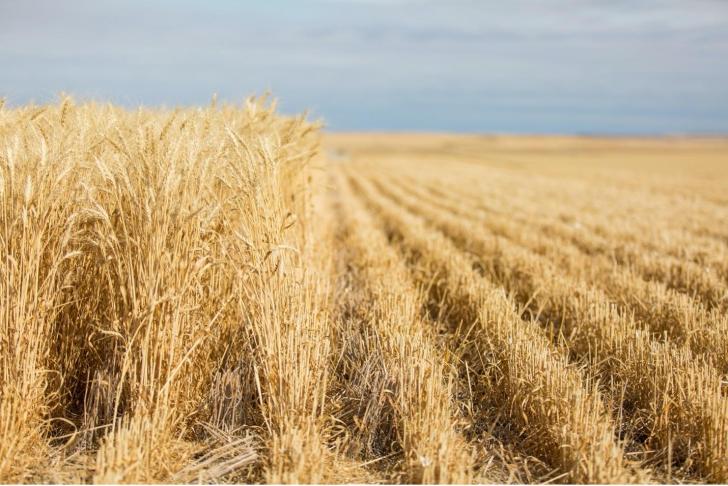News / National
Midlands sets target of 12 000 hectares of wheat
13 hrs ago | Views

Farmers in Midlands have made impressive progress in the 2025 winter wheat planting season, with over 1,000 hectares already planted and 824 hectares having germinated. This early momentum signals a positive outlook for wheat production in the region.
Winter wheat planting typically runs from mid-April to late May, with the first two weeks of May considered the ideal planting window for the high-veld areas. While planting can extend into mid-June, it is generally discouraged due to diminishing yield potential. In the low-veld areas, planting may begin earlier.
The province aims to reach an ambitious target of 12,000 hectares this season, matching last year's achievement of 12,081 hectares. This push is supported by government initiatives such as the Presidential Inputs Programme (PIP) and growing interest from both commercial and smallholder farmers.
Midlands Provincial Director for Agricultural Rural Development and Advisory Services, Ms Busiso Mavankeni, noted that planting has so far been concentrated in Kwekwe District, which accounts for 85 percent of the province's winter wheat production. Leading producers in the district include Douglas Kwande of DCK Investments (DCK Farm), Daniel Burger of Sherwood Park Estate, and the First Family's Pricabe Farm, which planted over 500 hectares last year.
"Land preparation, contracting, and planting are the key activities underway," said Ms Mavankeni, adding that recent late rains have aided farmers by making land preparation faster and easier.
Irrigated wheat growing areas include Sherwood Block in Kwekwe, as well as parts of Mberengwa, Lower Gweru, and Shurugwi.
Farmers have begun collecting seeds and fertilisers from Grain Marketing Board depots in key production zones, bolstered by support from government and agricultural development initiatives such as the Arda Presidential irrigation schemes and the Arda Joint Venture projects.
Ms Mavankeni urged farmers yet to start planting to move quickly to meet the May to August planting window, with harvesting expected from October to December. She also highlighted the importance of pest control, advising farmers to scout for quelea birds, identify roosting sites, and report them to Agritex extension officers or the Migratory Pests Department. "Drones are available for bird control," she added.
The Zimbabwe National Water Authority (Zinwa) has assured farmers that dam water levels are higher than last season, guaranteeing sufficient irrigation water for the winter crop.
With strong government backing and favorable conditions, Midlands Province is poised for a robust winter wheat season that could boost food security and rural incomes across the region.
Winter wheat planting typically runs from mid-April to late May, with the first two weeks of May considered the ideal planting window for the high-veld areas. While planting can extend into mid-June, it is generally discouraged due to diminishing yield potential. In the low-veld areas, planting may begin earlier.
The province aims to reach an ambitious target of 12,000 hectares this season, matching last year's achievement of 12,081 hectares. This push is supported by government initiatives such as the Presidential Inputs Programme (PIP) and growing interest from both commercial and smallholder farmers.
Midlands Provincial Director for Agricultural Rural Development and Advisory Services, Ms Busiso Mavankeni, noted that planting has so far been concentrated in Kwekwe District, which accounts for 85 percent of the province's winter wheat production. Leading producers in the district include Douglas Kwande of DCK Investments (DCK Farm), Daniel Burger of Sherwood Park Estate, and the First Family's Pricabe Farm, which planted over 500 hectares last year.
"Land preparation, contracting, and planting are the key activities underway," said Ms Mavankeni, adding that recent late rains have aided farmers by making land preparation faster and easier.
Irrigated wheat growing areas include Sherwood Block in Kwekwe, as well as parts of Mberengwa, Lower Gweru, and Shurugwi.
Farmers have begun collecting seeds and fertilisers from Grain Marketing Board depots in key production zones, bolstered by support from government and agricultural development initiatives such as the Arda Presidential irrigation schemes and the Arda Joint Venture projects.
Ms Mavankeni urged farmers yet to start planting to move quickly to meet the May to August planting window, with harvesting expected from October to December. She also highlighted the importance of pest control, advising farmers to scout for quelea birds, identify roosting sites, and report them to Agritex extension officers or the Migratory Pests Department. "Drones are available for bird control," she added.
The Zimbabwe National Water Authority (Zinwa) has assured farmers that dam water levels are higher than last season, guaranteeing sufficient irrigation water for the winter crop.
With strong government backing and favorable conditions, Midlands Province is poised for a robust winter wheat season that could boost food security and rural incomes across the region.
Source - zimpapers


































